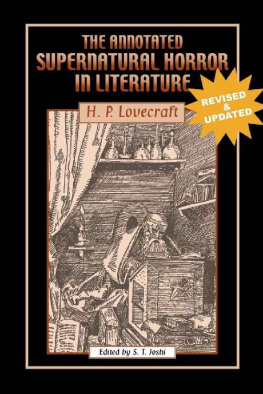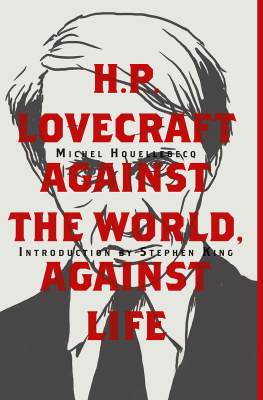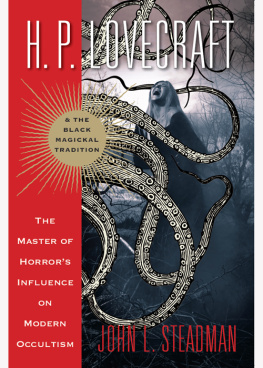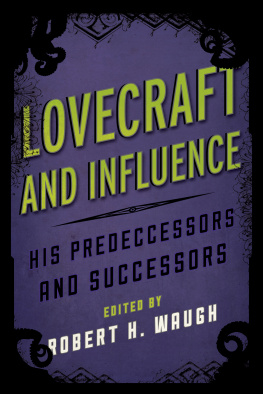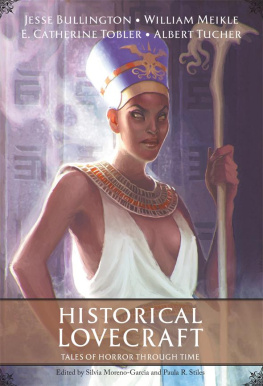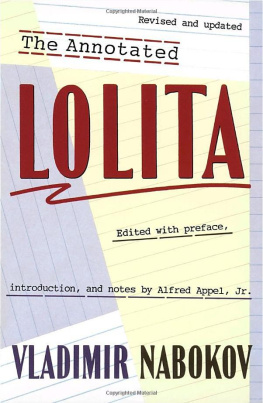H. P. Lovecraft - The Annotated Supernatural Horror in Literature: Revised and Enlarged
Here you can read online H. P. Lovecraft - The Annotated Supernatural Horror in Literature: Revised and Enlarged full text of the book (entire story) in english for free. Download pdf and epub, get meaning, cover and reviews about this ebook. year: 2013, publisher: Hippocampus Press, genre: Art. Description of the work, (preface) as well as reviews are available. Best literature library LitArk.com created for fans of good reading and offers a wide selection of genres:
Romance novel
Science fiction
Adventure
Detective
Science
History
Home and family
Prose
Art
Politics
Computer
Non-fiction
Religion
Business
Children
Humor
Choose a favorite category and find really read worthwhile books. Enjoy immersion in the world of imagination, feel the emotions of the characters or learn something new for yourself, make an fascinating discovery.
- Book:The Annotated Supernatural Horror in Literature: Revised and Enlarged
- Author:
- Publisher:Hippocampus Press
- Genre:
- Year:2013
- Rating:4 / 5
- Favourites:Add to favourites
- Your mark:
- 80
- 1
- 2
- 3
- 4
- 5
The Annotated Supernatural Horror in Literature: Revised and Enlarged: summary, description and annotation
We offer to read an annotation, description, summary or preface (depends on what the author of the book "The Annotated Supernatural Horror in Literature: Revised and Enlarged" wrote himself). If you haven't found the necessary information about the book — write in the comments, we will try to find it.
The Annotated Supernatural Horror in Literature: Revised and Enlarged — read online for free the complete book (whole text) full work
Below is the text of the book, divided by pages. System saving the place of the last page read, allows you to conveniently read the book "The Annotated Supernatural Horror in Literature: Revised and Enlarged" online for free, without having to search again every time where you left off. Put a bookmark, and you can go to the page where you finished reading at any time.
Font size:
Interval:
Bookmark:
Supernatural Horror in Literature

| CE | Collected Essays (Hippocampus Press, 2004-06; 5 vols.) |
| D | Dagon and Other Macabre Tales (rev. ed. Arkham House, 1986) |
| DH | The Dunwich Horror and Others (rev. ed. Arkham House, 1984) |
| ES | Essential Solitude: The Letters of H. P. Lovecraft and August Derleth (Hippocampus Press, 2008; 2 vols.) |
| FDOC | S. T. Joshi, ed., H. P. Lovecraft: Four Decades of Criticism (Ohio University Press, 1980) |
| JHL | John Hay Library, Brown University (Providence, RI) |
| LAL | Lovecraft at Last by Lovecraft and Willis Conover (1975) |
| LL | S. T. Joshi, Lovecraft's Library: A Catalogue, rev. ed. (Hippocampus Press, 2012) |
| MM | At the Mountains of Madness and Other Novels (rev. ed. Arkham House, 1985) |
| MW | Miscellaneous Writings (Arkham House, 1995) |
| OFF | O Fortunate Floridian: H. P. Lovecraft's Letters to R. H. Barlow (University of Tampa Press, 2007) |
| SHL | "Supernatural Horror in Literature" |
| SL | Selected Letters (Arkham House, 1965-76; 5 vols.) |
Font size:
Interval:
Bookmark:
Similar books «The Annotated Supernatural Horror in Literature: Revised and Enlarged»
Look at similar books to The Annotated Supernatural Horror in Literature: Revised and Enlarged. We have selected literature similar in name and meaning in the hope of providing readers with more options to find new, interesting, not yet read works.
Discussion, reviews of the book The Annotated Supernatural Horror in Literature: Revised and Enlarged and just readers' own opinions. Leave your comments, write what you think about the work, its meaning or the main characters. Specify what exactly you liked and what you didn't like, and why you think so.

